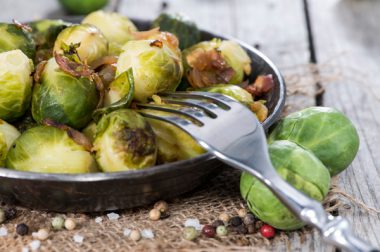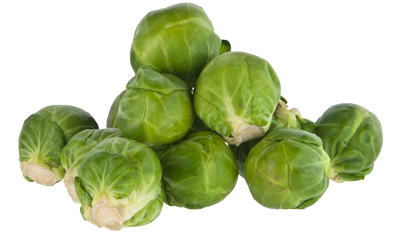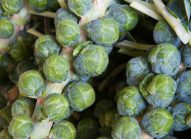Recipes we love
See all recipesBrussels sprouts with caramelized pears
Caramel allows to make vegetables which often frighten children more appetizing....
Health
benefits
The vegetable for future mothers
Brussels sprouts are very high in vitamin B9, also known as folic acid, and are recommended during pregnancy to meet the increased requirement for this vitamin. In fact, vitamin B9 is vital for a baby’s healthy development, particularly for brain development during the first trimester of pregnancy.
Brussels sprouts are also:
- A source of vitamin B6 (heart function, energy, the nervous system)
- A source of vitamin C (the immune system, collagen formation, energy, the nervous system, fatigue, iron absorption)
- A source of fiber (bowel function, filling)
- A source of potassium (nervous system, muscle function, blood pressure)
Brussels sprouts also contain:
- Glucosinolates, like other cruciferous vegetables. They help protect us from cancer, particularly lung cancer and cancers that affect the digestive tract.
Nutritional
composition
When is the right time
to eat Brussels sprouts?
In the autumn and winter.
Brussels sprouts are a cold season vegetable. They’re in season from September to December, and some late varieties are still available in supermarket aisles until March.
Vegetable patch
or urban balcony?
Brussels sprouts are an herbaceous biennial plant that prefers deep, rich, cold, humus-rich soils.
To learn everything you need to know about growing Brussels sprouts, read the page on growing advice.
Choosing
and storing
Choosing the best Brussels sprouts:
- The best are still attached to the stem, but this is difficult to come by
- Fresh Brussels sprouts have an even green color from stem to leaf
- Choose smaller sprouts, as these are more tasty
Storing Brussels sprouts:
- In the refrigerator: One week in the vegetable drawer, unwashed, to prevent the leaves from wilting
- In the freezer: Up to one year after blanching
Tips
and tricks
How to prepare Brussels sprouts
Prepare Brussels sprouts by first cutting the bottom off and removing damaged leaves, if necessary.
Then cook in boiling water for 20 to 25 minutes to prevent loss of flavor and crunch. They’re cooked when they can be easily pierced with a knife.
A tip for keeping Brussels sprouts green after cooking: Rinse immediately in a bowl of ice water. Serve right away or use another cooking method (fried, purée, etc.)
Brussels sprouts go well with:
Brussels sprouts have a strong flavor that goes well with other equally strong flavors. They should ideally be served with rich and/or smoked meats, aged, ripe cheeses like blue cheese, in a stew, with minced meat, chicken, or in a soup.
Served in a salad, braised, or stuffed are simple, low-cost, easy ways to prepare the vegetable, but it can also be added to more sophisticated dishes.
It’s ideal served with potatoes to make stoemp (a Belgian dish) or purées.
It can be served cold as an unusual salad starter with cranberries, walnuts, and Roquefort.
And why not try sweet and sour? Brussels sprouts also go well with apples, chestnuts, raisins, and honey. Why not try it out?
Can everyone eat them?

Young children
Brussels sprouts shouldn’t be introduced into children’s diets until they are older than 15-18 months because of its strong taste, it can be difficult to chew, or it could be swallowed the wrong way, and because it can be hard on the digestion.
Although often rejected by older children, Brussels sprouts are still an easy vegetable to use in all recipes from the most traditional to the most unusual. Serve cooked, chopped, and mixed into a purée with potato to get children to like Brussels sprouts
And everyone else
As part of a low-calorie diet, it’ hard to beat Brussels sprouts: the effort required to chop, prepare, and chew them no doubt burns more calories than what you get when you eat them!
Some people with sensitive digestion might find Brussels sprouts hard to tolerate. In this case, ask advice from a health professional.
See plenty of other tips for encouraging children to eat vegetables
Where do they come from?
Origins and varieties
Origins
Most Brussels sprouts are produced by the UK, the Netherlands, and Belgium. The British are the biggest consumers of Brussels sprouts in the world, followed by the Dutch.
Varieties
There are several varieties of Brussels sprouts adapted to different seasons and climates. Some are early varieties (September to November), like the Asgard, Cor, Lunet, Mallard, Nicoline, Porter, Riga, etc., varieties, semi-late varieties (production in November and December) like Citadelle, Héraclès, Kundry, Odessa, Pilar, Rampart, Tornado, etc., or late (production from January to March), like Content, Edmund, Stat, Gabion, Igor, Lauris, Pinacle, etc.



 Chard
Chard  Artichoke
Artichoke  Plant Diseases, Garden Pests, and Possible Treatments
Plant Diseases, Garden Pests, and Possible Treatments 











